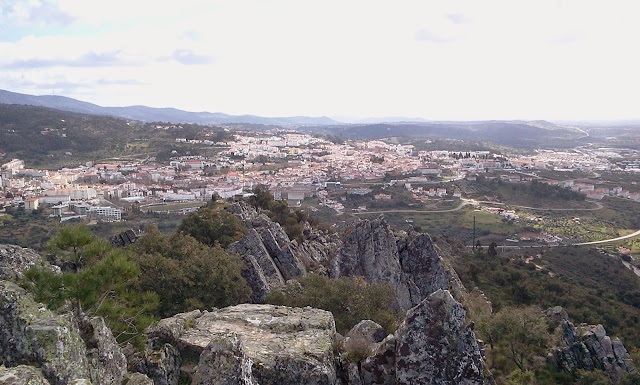. . . Portugal, and perhaps people and places in general . . .
Arriving yesterday in low cloud and slight rain, Portalegre was a puzzle without an obvious centre, built on a mountainside, it took a while to locate the hostel . . .
Today it's sunny, with a few clouds and the hill opposite town, with church halfway up, 270 steps in 10 stages, seats after each stage to rest . . . two telecoms masts after the church, and at the summit a cross, with spotlights . . . an irresistible challenge . . . only 40 minutes climbing, but steep . . .
From the top, the town comes into perspective with the plain to the west, mountains to the east, roads in four directions . . . the cathedral and the Robinson factory chimneys, landmarks on the skyline from closer, are lost in the town from the hilltop . . .
. . . which sets me musing on the question of emigration and immigration in the local context: fewer North Europeans in evidence, estate agents' windows without translation into English, German, French . . . in the national context: the colonial period, Brazil, Angola, Mozambique, Goa, Macau . . . movement for work, adventure, new lives . . . economic emigration over centuries to France, Britain, USA, Australia . . . the absorption of returnees after Independence . . . the arrival of British business people, Robinson here (processing cork into tiles amongst other things), Mason in Mina de Sao Domingos (the company had its own police force to quell the sometimes rebellious miners, and polluted the Guadiana), Port wine people around Porto (my aunt was nanny to Simon Berry of Berry Bros and Rudd, though never went to Portugal as far as I recall - her claim to fame was to have curtsied to HRH Elisabeth . . . a willing servant and ardent monarchist, easily and often offended by my republican father . . . )
. . . my own perceptions of growing horror walking along the Algarve coast . . . the villas with high fences, thirsty golf courses, arrogant English expecting Portuguese people to speak our language in their country . . .
. . . hereabouts it feels friendlier; fewer foreigners, maybe Pedro from Evora's observation about tolerance affecting my perception . . . Jose, the father of Joao, helping with the hostel between running his electrical goods shop below, genuinely keen to help me see the best of Portalegre and surrounding area . . .
. . . and conscious too, that my commentary on the issue as an internationalist Englishman in Portugal, sounds similar to views I usually eschew in my own country . . . perhaps the focus is different, but I want to examine my narrative for hypocrisy . . . and for "bleeding liberal" tendencies as well as class war ones . . . what I observe is separation and fear from both sides which serves neither . . . and inequality, as always, is at the root of it . . .
As for historical perspective, a few hundred years helps reshape attitudes - who in England talks about the "bloody Normans, coming over here, killing our king, giving away the land to their mates . . . "?
An evolutionary perspective shows that humans are virtually identical, whatever language they speak (leaving aside for now theories of hominid infiltration) . . .
And an ecological perspective suggests that if we keep on acting as if there are unlimited resources on this small planet we call home, our evolutionary journey will end before the earth does . . .
Portalegre, meanwhile, calls for another day or two's exploration . . . maybe a bus towards the Spanish border and a saunter back . . .



No comments:
Post a Comment